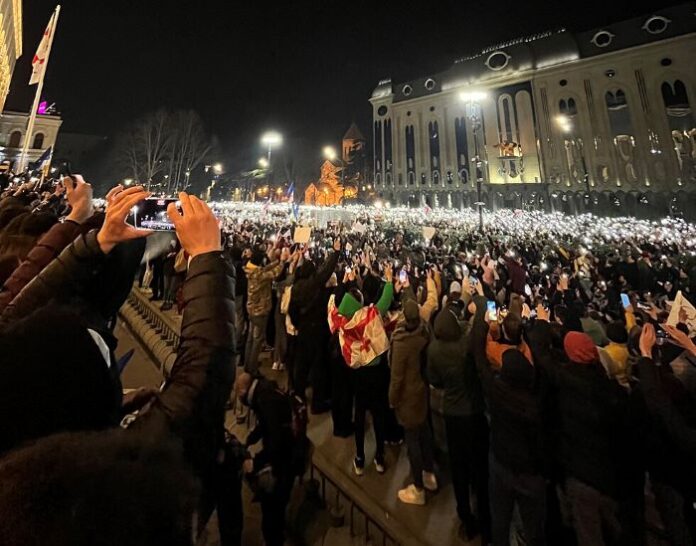On Thursday, the European Parliament adopted a resolution urging the Georgian Parliament to stop adopting a draft law against EU values and principles. The resolution states that the EU accession negotiations with Georgia should not start if the ‘foreign agents’ law passes.
The proposed law, currently under discussion in the Georgian Parliament, would impose limitations on civil society and undermine the freedom of independent media. On April 17, 2024, the Georgian Parliament approved the “transparency of foreign influence” law in its first reading. This law would mandate organisations receiving over 20% of their funding from abroad to register within two months as “organisations pursuing the interests of a foreign power.” These organisations would be subjected to increased scrutiny, reporting requirements, and possible sanctions, which would significantly impede the ability of media and civil society to operate freely, according to MEPs.
“The law violates the European Commission’s recommendations on Georgia’s candidate status, is incompatible with EU values and democratic principles, and runs against the Euro-Atlantic aspirations of the Georgian people, closely mirroring Putin’s law. Instead of genuinely strengthening transparency and fighting against the malign influence of the Kremlin, the proposed law will undermine the freedom of civil society and the media,” stresses Miriam Lexmann MEP, who negotiated the text on behalf of the EPP Group.
The European Parliament adopted the resolution with 425 votes in favour, 25 against, and 30 abstentions. MEPs stated that the law would impose debilitating restrictions and reiterated that it is incompatible with EU values and principles and runs against Georgia’s EU membership ambitions.
MEPs urged the Georgian Parliament to stop the proceedings leading to the law’s adoption, which has sparked mass protests in the country. They expressed concern about reports of riot police using disproportionate force to disperse protesters and called on the Georgian authorities to investigate and hold accountable those responsible.
While the Parliament expressed unwavering support for the Georgian people’s European aspirations, it also stressed that EU accession negotiations should not be opened as long as such a law is part of Georgia’s legal order. MEPs called on the Commission and EU countries to assess the impact of this draft law on the EU’s role as a donor in Georgia.
MEPs also denounced that the Georgian government is taking inspiration from similar Russian legislation used to stifle civil society, independent media, and political opposition.
“Georgia needs de-Bidzinization laws, not Russian laws in a country which wants to join the EU,” says Rasa Juknevičienė, the EPP Group Vice-Chair in charge of Foreign Affairs, referring to the Georgian oligarch and former Prime Minister with ties to Russia, Bidzina Ivanishvili. Ivanishvili founded the ruling Georgian Dream party, an ally of Vladimir Putin and Viktor Orbán, which is attempting to reverse the country’s pro-European path.
“The Kremlin has become very active in the EU, but also in the EU’s close neighbourhood. We fully support those protesting against the foreign agents law, as it is this law that is leading the country towards Russia and away from the EU,” Juknevičienė stressed.

